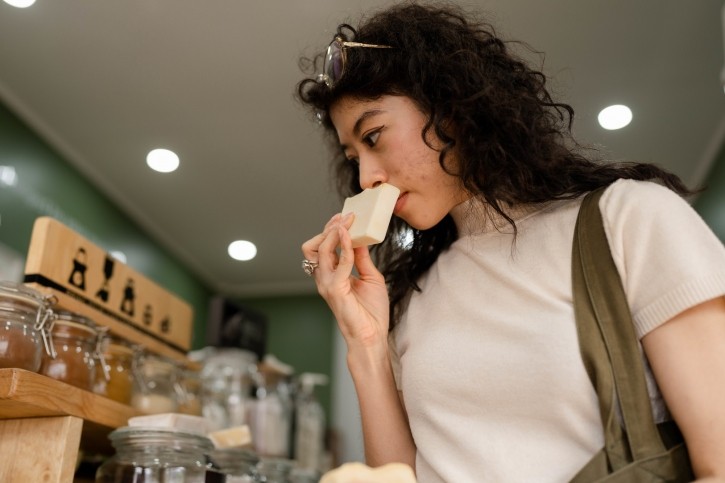The Body Shop survey: Over 50% of consumers highlight importance of sustainable packaging

A recent consumer survey commissioned by British cosmetics, skin care, and perfume company The Body Shop has determined that beauty consumers are “most interested in purchasing products that are responsibly sourced and sustainably made by brands providing ethical working conditions,” according to the survey data’s results.
To learn more about the reasons why the B Corp company commissioned the survey, its key takeaways, and the ways cosmetics and personal care product manufacturers and suppliers can work to make ethical decisions part of their company ethos, we interviewed Hilary Lloyd, Vice President of Marketing and Corporate Social Responsibility for The Body Shop North America for her insights.
CDU: Can you share some brief background about yourself and your relationship with the cosmetics and personal care product industries?
Hilary Lloyd (HL): I lead Marketing and Corporate Social Responsibility for The Body Shop across North America.
Since 2018, I’ve led our efforts championing radical bodies, ethical beauty, gender equity, 2SLGBTQ+ rights, and racial justice by shaping issues-based advocacy work including internal employee policies.
I will always be a champion for businesses and brands whose primary goal is to understand their consumers and work hard to meet their needs—all while trying to have a positive impact on people and the planet.
Outside of activism efforts at The Body Shop, we promise customers high-quality products made with ethically-sourced, natural, and hard-working ingredients that don’t harm the planet or any of the people or animals who call it home. In the last two years, we have doubled down on these efforts through introducing refillable products in stores, reformulating our offerings to be fully vegan, and strengthening our Community Fair Trade program.
CDU: Why did The Body Shop commission this consumer data study, and how does The Body Shop ensure ethical working conditions for its manufacturing and supply chain?
HL: This was a defining year for responsible business. We saw workers around the world fighting for fairer working conditions and big brands carefully considering whether to step back from or bolden their stances on 2SLGBTQ+ rights, reproductive freedom and so much more. We were inspired by all of the people we saw fighting to create change —and were curious to learn if consumers felt the same.
So, The Body Shop commissioned a survey across North America to gauge how much all of this—a brand’s sustainability, willingness to engage on key social issues and working conditions—factored in when it came to holiday shopping.
On our part, The Body Shop ensures ethical working conditions for its manufacturing and supply chain largely through our Community Fair Trade program which sources ethical, high-quality ingredients from producers, farmers, and artisans across the world, providing better working conditions, equal wages and other economic opportunities to allow communities to thrive.
The program, started in 1987, is run independently, allowing us to maintain authentic, longstanding relationships with our supplier partners and offer economic opportunities to many who would ordinarily be left out of the global economy, or possibly exploited by it. We’ve worked with many of the same suppliers for decades and because of this, have often been able to contribute additional funds to invest in community projects such as education, healthcare, and sanitation.
CDU: What are the key takeaways from the study?
HL: Through the survey data, we found a few things that were surprising to us.
- Gifts made ethically matter to shoppers. More than half of consumers in both the U.S. and Canada say that purchasing from a brand that practices sustainable packaging and sourcing is important to them.
- Across the board, customers expect to spend less this holiday season, which wasn’t surprising given the effects of inflation. But, we were happily surprised that the majority of consumers agreed an ethically sourced gift at a reasonable price point could influence their decision.
- Of all the issues, employees’ working conditions were most top of mind. Strikingly, nearly two-thirds of consumers in the U.S. and Canada say purchasing from a brand that provides ethical working conditions is important to them.
As a proud B Corp, we were heartened by these results.
CDU: Were any of the findings surprising or unexpected, and if so, why?
HL: It was exciting to see consumer sentiment was widely agreed upon across North America, with sustainability and ethical practices rising to the top of the priority list. Over the last few years in particular, companies have had to disclose what they’re doing to protect people and the planet, and as a result, customers are paying attention and holding brands to higher standards.
That said, we were surprised to see that holiday shoppers cared the most about a company’s working conditions above all else. There has been tremendous worker power this year—with strikes happening around the world, from Bangladesh to much of the US—and we think this has shifted the conversation.
CDU: How can ingredient manufacturers and suppliers make ethical decisions as part of their ethos?
HL: Our founder Anita Roddick said “If you don’t hear the voice of the farmer in everything that you do, then what you do is wrong.” This is key. Through our own Community Fair Trade practice, we are letting our local suppliers take the lead. We tap into their knowledge and wisdom, because they know best how to utilize the natural resources in their region in responsible ways.
Adopting ethical practices means putting people over profit. It takes leadership and transparent relationships with suppliers to uphold ethical standards related to labor rights, clean and safe working conditions, fair working hours, equal pay and more. It’s not easy, but the result is a working relationship that is enriching for everyone.
CDU: What are The Body Shop’s plans to become more ethically responsible in ingredient sourcing, manufacturing, and product distribution?
HL: As a B Corp, we always strive to go beyond business as usual and undergo rigorous evaluations every three years to ensure we’re maximizing our social and environmental impact, including through our sourcing, manufacturing, and distribution. We are constantly in conversations with our Community Fair Trade suppliers to figure out how we can create the strongest possible working relationship for every person who touches The Body Shop’s supply chain.













